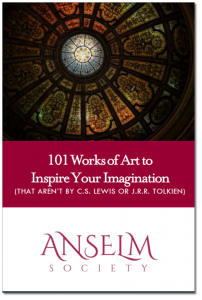EPISODE SUMMARY:
In season 4 of the Eudo Podcast, we are exploring how seeing and delighting in God’s good world changes how we live and move and have our being in a sacramental universe. In our last episode, we focused on two activities—work and play—that form the bulk of our time each day and noted that even there we can worship and serve God. In episode 10, we want to explore the question of how a sacramental view of the world shapes our way of relating. We’re going to talk about sex, marriage, and love in a sacramental universe.
EPISODE NOTES:
The Cultural Understanding of Sex
Here are some thoughts:
- The sexual revolution of the 1960s and 70s promised freedom and bliss but has brought pain and slavery instead. Free sex has become cheap sex.
- Sociologist Mark Regnerus’s book Cheap Sex summarizes the last fifty years [1]: the 1960s gave us the pill, disconnecting sex from childbearing, the 1990s and 2000s gave us widespread access to the internet, along with easy access to pornography and dating sites, the 2010s gave us smart phones and even easier access to dating apps such as Tinder, making it even easier for men and women looking for casual sex to find each other. As a result: The “cost” of finding sexual gratification is far lower than it used to be. But these “low prices”—are not good—there are hidden costs in terms of increased loneliness, STDs, the commodification of people and things, and more…
- Today’s culture is a hookup culture. The main idea: “it may be difficult to find love, but it’s pretty easy to find sex.”
- The only real ethical concern for most today regarding sex is that it should be consensual and the other person should be an adult. Apart from those two ethical principles, anything goes.
The Cultural Understanding of Marriage
Two Competing Views on Marriage:
- Conjugal View: marriage is a comprehensive and covenantal union of body and soul between a man and a woman for a life. On this traditional view of marriage, there is an essence to marriage. Marriage is a sacrament, a gift, and it is also a sign—it points to a deep mystery, the mystery of the union between Christ and the Church, between the human and divine.
- Revisionist View: marriage is, in essence, a loving emotional union, one distinguished by its intensity; one in which fidelity is ultimately subject to one’s own desires. In marriage, so understood, partners seek emotional fulfillment, and remain as long as they find it.
On the revisionist view, marriage has been described as a “fair exchange of affection” [2].
The Cultural Understanding of Love
The modern view can be summarized as “passion” – “Love as passion.” This form of love is new to our age, and it is shaped by a corresponding redefinition of freedom:
- Old: Freedom to do what you ought to do (freedom ordered to the good)
- New: Freedom to do what you want to do (freedom ordered to the passions of the individual)
Thus, “modern intimacy is essentially romantic.” The problem with modern (revisionist conceptions of marriage build on “love as passion” and a (the economic notion) of self-interested consumption: “Inevitably, the useful marriage will be of little use.”
How Should We Begin to Think about Marriage, Sex, and Love as Christians?
We can summarize the Biblical teaching on marriage as follows:
- The World: says the center of marriage is self-interest and utility.
- The Church/The Bible: says the center of marriage is “God’s love” and personal intimacy between husband and wife is “at” the center (but not “the” center), rooted in the love of God. At least two Implications:
- Marriage is a sacrament/a gift. We learn to be in love, to be in a marriage, as we grow in Christ as disciples in the church, as we enter into the rhythm of church life/ as we gather together as people who worship. Thus, “the imitation of Christ… is the key purpose of marriage” [3].
- Marital intimacy doesn’t depend upon the heights of sexual union. Here is a helpful quote by the theologian David Matzko McCarthy: “Joined by friendship to God, we face our spouses without fear of the ordinary, or fear of our aging bodies… The practice of discipleship among the company of friends promise to make rich marriages out of mediocre sex” [4].
How can We Rediscover this Sacramental Image of Marriage, Sex, and Love?
According to the traditional Christian view of sex and marriage, marriage is a covenantal union between a man and women for life (Gen. 2:24; Matt. 19:3-6); sex within marriage is appropriate and encouraged; sex outside marriage, including homosexual sex, is prohibited (Lev. 18:22; 20:13; Mark 7:20-3; Rom. 1:26-27; 1 Cor. 6:9-10; 1 Tim. 1:9-10).
But there is a deep problem with the traditional view: it is no longer seen as plausible or desirable by many in culture today. The solution is not to reject the traditional teachings on sex, love, and marriage. Rather, to solution is to work to make the traditional view plausible again.
Three ways that we can join with God and each other to help make traditional views of marriage and sex plausible and desirable again [5].
First, we must reject anti-intellectualism as a church as we must seek to properly understand key Christian doctrines such as the believers’ union with Christ, original sin, celibacy, and the nature of the church.
Second, we must seek wholeness.
Third, we must seek to re-baptize our imagination with respect to marriage.
Cultural views on marriage have shifted. Today, marriage is viewed by many as an emotional union between consenting partners. With growing frequency, Christians, inordinately shaped by a disenchanted culture, are adopting the same revisionist view of marriage. However, it’s no accident that traditionally marriage, understood as a union of body and soulbetween a man and women for life, is considered a sacrament of the church. As a sacrament, it is a signpost, a symbol, “an earthly representation of a spiritual reality—the union between Christ and his bride, the church (Eph. 5:31-2). God created the institution of marriage—unity within difference—to reveal the depth of his passionate love for us.
CONCLUDING REMARKS:
There is an essence to marriage. If we want the traditional Christian teaching of sexuality to be viewed as plausible and desirable, we must see marriage in its proper light: as a sacrament, a symbol of God’s passionate, pursuing love in which sex is a gift and foretaste of the bliss we will experience with Christ for eternity.
RESOURCES MENTIONED:
- Allbery, Sam. Why Does God Care Who I Sleep With? Epsom: The Good Book Company, 2020.
- Gould, Paul. Cultural Apologetics: Renewing the Christian Voice, Conscience, and Imagination in a Disenchanted World. Grand Rapids, MI: Zondervan, 2019.
- McCarthy, David Matzko. “Becoming One Flesh: Marriage, Remarriage, and Sex,” in The Blackwell Companion to Christian Ethics, 2nd, eds. Stanley Hauerwas and Samuel Wells. Malden, MA: Blackwell, 2011.
- Regnerus, Mark. Cheap Sex: The Transformation of Me, Marriage, and Monogamy. New York, NY: Oxford University Press, 2017.
For a the free e-book from our season 4 sponsor, click this link: “101 Works of Art to Inspire Your Imagination (That Aren’t by C. S. Lewis or J. R. R. Tolkien)”


[1] Mark Regnerus, Cheap Sex: The Transformation of Me, Marriage, and Monogamy (New York, NY: Oxford University Press, 2017).
[2] David Matzko McCarthy, “Becoming One Flesh: Marriage, Remarriage, and Sex,” in The Blackwell Companion to Christian Ethics, 2nd ed., eds. Stanley Hauerwas and Samuel Wells (Malden, MA: Blackwell, 2011), 277.
[3] Ibid., 280.
[4] Ibid., 281.
[5] A more robust discussion can be found in Paul Gould, Cultural Apologetics: Renewing the Christian Voice, Conscience, and Imagination in a Disenchanted World (Grand Rapids, MI: Zondervan, 2019).





